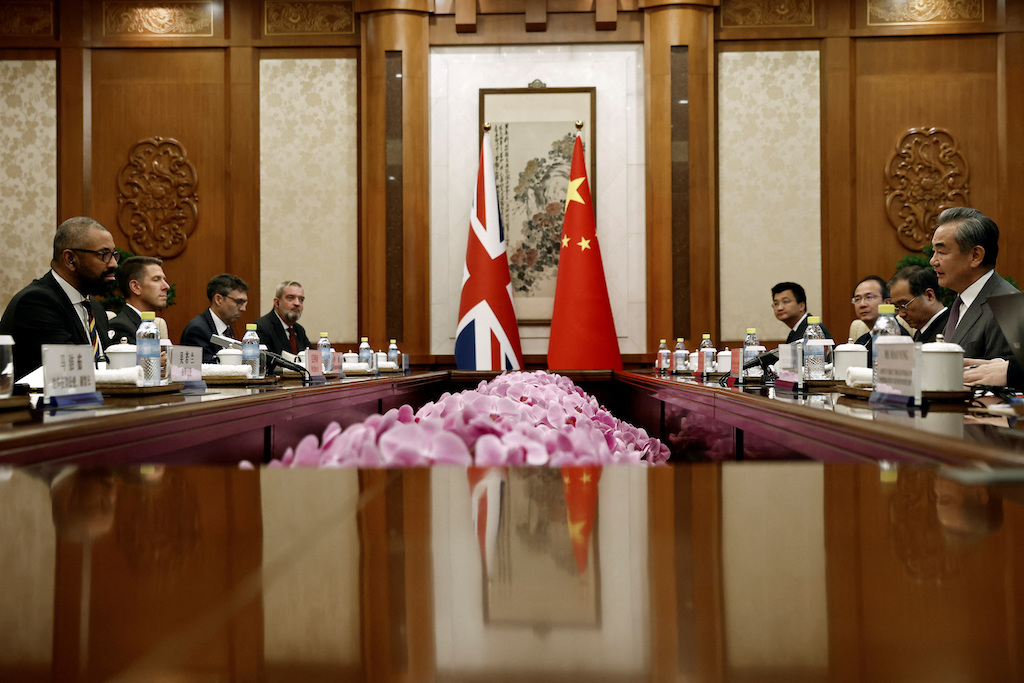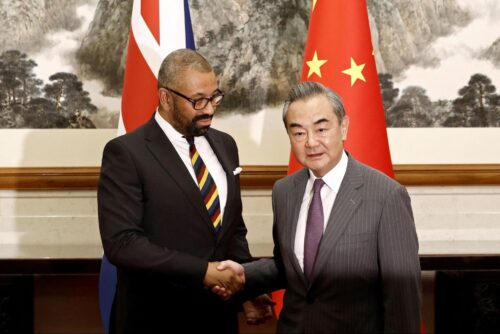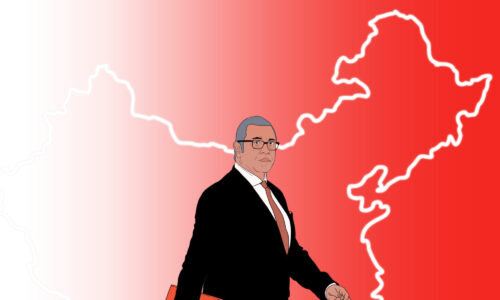U.K. foreign secretary leaves Beijing empty-handed but relieved
“I’m realistic that one phone call, one visit, one meeting isn’t going to fundamentally change the direction of travel,” James Cleverly told the BBC. But “patient, consistent, and reliable communication could have an effect."

James Cleverly’s first visit as foreign secretary to China matched the low expectations of a severely divided Conservative Party, but spared Rishi Sunak’s government further humiliation abroad after a torrid period at home.
Sunak sent Cleverly to Beijing — the first visit by a U.K. foreign secretary to Beijing in five years — to try to put Sino-British relations back on a more even keel, while still raising concerns on Taiwan and Ukraine, and registering disapproval of China’s crackdown against Hongkongers and Uyghurs.
China’s response was bland and formulaic, allowing Cleverly to leave without loss of face while also ensuring he didn’t achieve anything. Beijing brought out the oft-used line that foreign powers shouldn’t intervene in China’s domestic affairs. The Chinese Foreign Affairs Ministry spokesperson Wāng Wénbīn 汪文斌 reiterated China’s claim over Taiwan’s sovereignty.
Yin Zhiguang, a professor at the School of International Relations and Public Affairs under Fudan University, told Chinese mouthpiece Global Times that the U.S. is behind China hawks in the U.K. “Yin said the noises made by U.K. conservative hawkish forces within the U.K. Conservative Party are actually deeply affected by the U.S., and they will keep on interrupting the China-U.K. relations, especially when they want to unify the party with a hawkish stance before the general election,” Global Times noted.
Calls for a China strategy back home
Cleverly’s brief visit got off to an inauspicious start, as it coincided with publication of a major parliamentary report by a cross-party committee that lambasted the government for failing to have a coherent approach on China and concluded that there appears to be “confusion across Whitehall about the Tilt to the Indo-Pacific, stemming from a failure to explain the policy.”
“Tilting horizons: the Integrated Review and the Indo-Pacific,” published by the influential Foreign Affairs Committee in the House of Commons, called on Britain to “protect the self-determination of the people of Taiwan” by deterrence diplomacy, and labeled the Chinese Communist Party (CCP) “a threat to the U.K. and its interests.”
Committee chair Alicia Kearns, a Conservative lawmaker, commented at the launch of the report that “Taiwan is an important ally and partner of the U.K. The Government should stand shoulder to shoulder with Taiwan, making clear that attempts to undermine Taiwanese self-determination are unacceptable.”
“China’s global ambitions and desire to rival the reach and influence of the West were made clear at the recent BRICS summit, but the writing has been on the wall for years,” Kearns warned. “It’s only by shoring up our networks in the Indo-Pacific that we can temper China’s economic and political expansionism, offering a viable, democratic alternative to Indo-Pacific states.”
In Beijing, Cleverly met Chinese Vice President Hán Zhèng 韩正 and Foreign Minister Wáng Yì 王毅 last week. He defended the trip by citing the importance of direct cooperation between the two countries on climate change and other challenges.
“I’m realistic that one phone call, one visit, one meeting isn’t going to fundamentally change the direction of travel, [but] patient, consistent, and reliable communication could have an effect,” he told the BBC. “That is why I bring up issues around human rights, Xinjiang, Hong Kong, and indeed individual cases every time I have meetings with representatives of the Chinese government.”
Being hard on China is in vogue
“Public conversations about China in the U.K. increasingly highlight the CCP’s threat to established international orders, be that institutions of global governance or free flows of business and trade,” James Gethyn Evans, a visiting lecturer at George Washington University, told The China Project.
The academic pointed out that Western politicians visiting Beijing in the near future will therefore likely need to loudly demonstrate their “tough-on-China” credentials to avoid being criticized back home.
“What has changed recently is that criticism of engagement with China is now coming from all sides of the political spectrum, which means that there is a higher political cost for Western politicians to meet with their Chinese counterparts,” Evans said.
U.S. Commerce Secretary Gina Raimondo’s mention that U.S. businesses see China as an “uninvestable” risk likely deflected criticism back home of her visit, particularly among Republicans, Evans said. Raimondo became the fourth high-level U.S. official to visit China this summer. But in comparison, “Cleverly’s visit produced no such soundbite and was therefore framed as capitulating to an adversary rather than engaging with a potential partner.”
Most human rights groups and activists in Britain are very skeptical about the value of Cleverly’s trip, according to Benedict Rogers, the co-founder and deputy chairman of the Conservative Party’s human rights commission and the CEO of Hong Kong Watch.
“We welcome the fact that he raised the key human rights concerns, including Hong Kong and Xinjiang, and that he specifically mentioned Jimmy Lai, which is a step forward, but one has to ask the question: Did he raise these issues in-depth and in a substantive way, or was it a tick-box exercise before getting on to other matters?” Rogers said, referring to the Apple Daily owner who was arrested three years ago. Lai, a British citizen, was not allowed to freely choose which lawyer to represent him, either.
“One also has to ask what are the policy actions he has in mind, because rhetoric alone, even if it is robust, is not enough. It is hard to tell what, if anything, the visit achieved except fulfilling Mr. Cleverly’s desire to visit Beijing, but time will tell,” he told The China Project.
China-Britain cooperation?
One low-hanging fruit is for China to remove sanctions against British lawmakers, an issue that Cleverly raised. In 2021, China slapped sanctions on several members of parliament and others, in retaliation for their criticism and advocacy work.
David Lammy, the Shadow Foreign Secretary for the opposition Labour Party, appeared unimpressed. “Thirteen years of Conservative inconsistency on China has damaged Britain’s interests,” he tweeted.
Ministers now need to get a grip on the U.K.-China relationship with tangible diplomatic wins, he said, adding, “The first test is whether Cleverly can secure an end to Chinese sanctions on U.K. Parliamentarians.”
Rogers said even if Beijing lifts the sanctions, it would not cost them anything significant and merely represents a goodwill gesture. “I would like to see the U.K. sanctioning officials in Beijing and Hong Kong responsible for dismantling Hong Kong’s freedoms, and I fear the chances of that are even smaller than previously, given Mr. Cleverly’s approach,” he said.
Within the party, there are some who support the trip.
For Richard Graham, an MP and chair of All Party Parliamentary China Group, it is in Britain’s interest that Cleverly should see his Chinese counterpart Wang Yi, and for Sunak to meet Xi at the G20 summit (though reports say Xi will skip the G20 in New Delhi next weekend).
“For whatever our many differences, China is key to global issues including Ukraine,” Graham tweeted. “And nothing, however frustrating, beats jaw to jaw engagement.”






